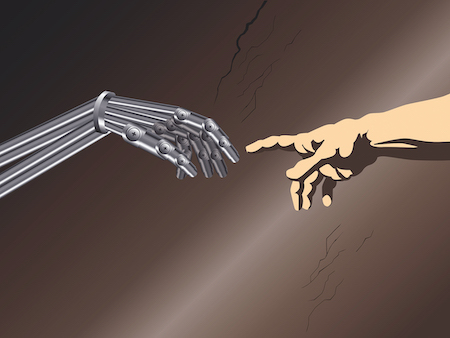Friendship and Artificial Intelligence
 No, this isn’t a post about how robots are going to replace our friends, or why Siri is a good substitute for human contact (it’s not). This is something else.
No, this isn’t a post about how robots are going to replace our friends, or why Siri is a good substitute for human contact (it’s not). This is something else.
I recently started to dabble in ChatGPT, so this is based on my new and admittedly limited experience. I’d spent a few weeks reading articles from writers who are using it for various tasks, as well as learning the copyright implications. I’m not going in with the intention of using it to write books or blog posts or essays; I’m limiting myself to investigating how I can use it for marketing, such as book descriptions. But the more I studied it, the more it seemed like entering prompts was similar to diagramming a sentence. For those of you unfamiliar with that long-ago English class assignment, here’s an example from Grammarly:

You start with a very basic, bare-bones sentence and fill in the details with adverbs, adjectives, phrases. I used to love doing this in school, which I guess is the definition of a word nerd. With ChatGPT, the first prompt is simple. The second prompt builds on that. Every subsequent prompt builds on the previous one. You start out with something kind of generic, but if you devote time to it, the complexities emerge. In fact, I read a definition of A.I. that made a lot of sense to me: “the goal of AI is to provide software that can reason on input and explain on output.”
Sounds like friendship.
Friendship? Okay, bear with me.
I spent time recently with two friends from high school. We’ve known each other since, well, LBJ was still president. A long time. One of the great advantages of long-term friendships is that you don’t have to finish every sentence. Just like predictive text when you’re doing a Google search, your friends finish your thoughts. “I walked in the door, and my brother was…” When you’ve known them a long time, they know your brother, too. You don’t have to go into detail because they can pretty accurately predict what your brother was doing.
Artificial Intelligence collects bits of information from millions of sources and refers to them when formulating a response. Your friends have collected bits of information about you over the years. Can you imagine what they could write about you? Or what you could write about them?
Loneliness was identified as a major public health issue long before COVID forced us into isolation. When we began to tentatively emerge, relating to others seemed to take extraordinary effort. We found it difficult to relate as we had before. Conversations were stilted, awkward; more like competing monologues. It was exhausting, and if you’re like me, you wondered at times if it was worth it.
We had to learn to connect all over again. We even tried to make new friends, something that’s a lot easier when you’re a kid. Kids are always around other kids - in the classroom, on the playground - engaging in similar activities. As an adult, especially during the isolation of a pandemic, we didn’t have that kind of connection. How do you create new ones?
Well, it takes time. Those long friendships of mine weren’t established overnight. It seems to me that you begin just like you do with AI: you keep it simple. You don’t immediately tell a potential new friend your whole life story (at least I hope you don’t). You start with one or two basic facts to figure out how you can connect.
Is it worth it? That’s for you to decide, because it’s not easy. Getting to know others, or trying to deepen current connections, takes effort and intention. It takes once again getting comfortable in those communal settings that were a big part of your life pre-COVID: bars, workplaces, volunteer shifts. You’ll need energy and the willingness to be vulnerable and open.
And trust that both you and your new friend will find a way to diagram that sentence.

